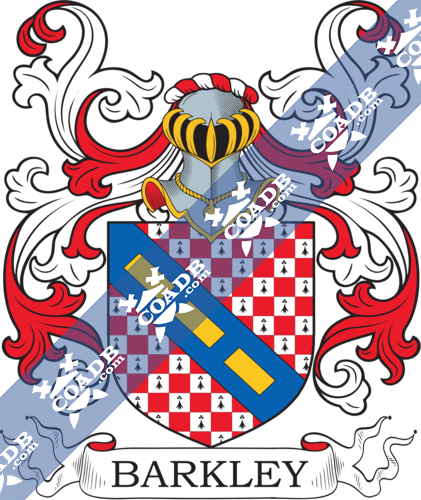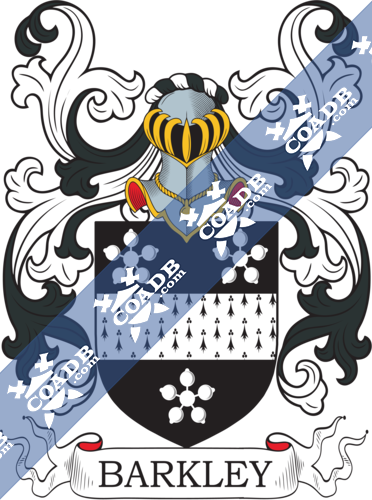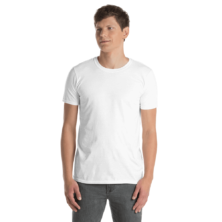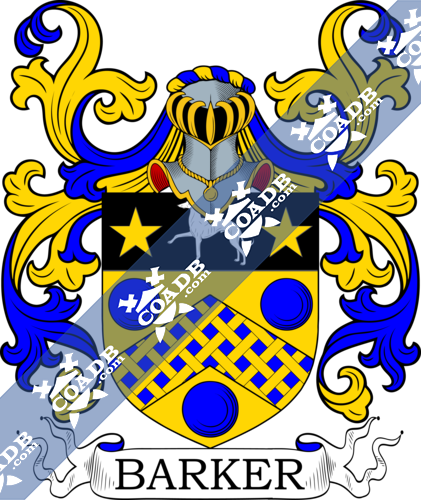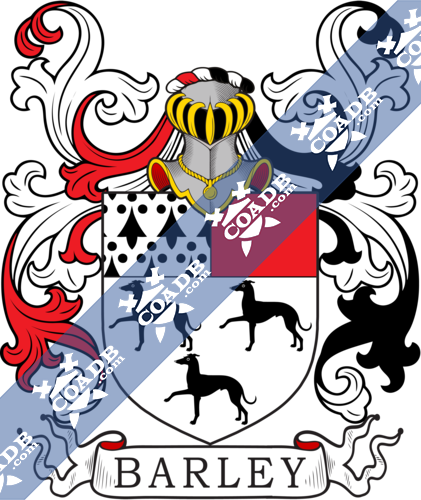Barkley Family Crest, Coat of Arms and Name History
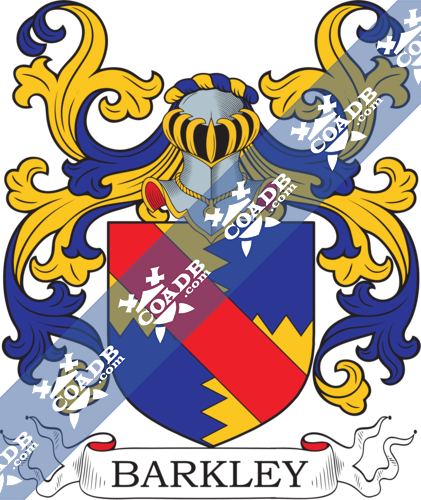
Barkley Coat of Arms Gallery
Don’t know which Coat of Arms is yours?
We can do a genealogical research. Find out the exact history of your family!
Learn MoreBARKLEY
Historically, surnames have various sources of origins. In the case of the name Barkley, it is English in origin, as it is derived from one of two locations called “Berkeley” located in either Gloucestershire or Somerset. This would classify the name as being topographical. The name “Berkeley” was formed from the ancient Anglo-Saxon compound word “Bercleah”. The prefix, “Berc” translates to birch and “leah” which translates to clearing. The name Berkeley is derived from the Anglo-Saxon for Birch-Wood. It means someone who lives at the Birch Tree Meadow. The Berkeley family is unique in English history, in that it has to this day an unbroken male line of descent from a noble Saxon ancestor before the Norman conquest of England in 1066 and also retains possession of much of the lands it held from the 11th and 12th centuries, centered on Berkeley Castle in Gloucestershire, which still belongs to the family. The Barkley/Berkley family has served or fought in almost every single war and conflict the English throne has prosecuted since the time of William the Conqueror.
Surnames were often created by using an identifying factor about a person such as; a familiar geographical location or a topographical landmark found near the individuals home or birthplace, using one of their parent’s names to create a patriarchal or matriarchal surname, their occupation, or a defining physical trait among other things. There was almost a limitless source from which surnames could be formed.
The use of surnames; however, did not become a common practice among the general population until the mid-sixteenth century. Until this time, surnames were generally reserved solely for the noble class. The use of surnames were found to serve a practical purposes, aside from making the distinction between people with like given names easier, it also allowed governments to more effectively track people for census, tax and immigration purposes.
The task of record keeping was primarily under the jurisdiction of the Church, local priories, and the government. This was due in large part to the fact that literacy was a skill usually found only among the nobles, the clergy, and government officials and scribes. Even so, there often existed multiple variations of names which may be attributed to a number of factors; the origins of the surname, the lack of guidelines which existed for spelling, and the fact that many scribes who were charged with record keeping spelled phonetically, among other things. One of the earliest records of anyone bearing the surname or any variation of its spelling is that of Roger de Berchelai found in official land records of Gloucester dated 1086. Some other early variations of the name include; Berkley; Barclay; Berkely; Berkeley; and Barcley among others.
The family descends from Harding, the son of Eadnoth (Alnod), who as “Marshal” or “Staller”, a high official under King Edward the Confessor. A study of dates makes it probable that this Harding had a son of the same name, perhaps the man who played a distinguished part in the Crusading Wars, helping King Baldwin I of Jerusalem, to win the battle of Jaffa in 1102. The son of the crusader would then be Robert Fitzharding (1095–1170) ‘Fitz’-meaning “son of” who was an Anglo-Saxon nobleman from Bristol who was granted the feudal barony of Berkeley in Gloucestershire.
Robert Fitzharding rebuilt Berkeley Castle, as Berkeley Castle had been originally a Norman motte-and-bailey mounded hill fort, (historically sometimes spelled Berkley Castle) the castle is located in the town of Berkeley, Gloucestershire, UK. The castle’s origins date back to the 11th century. The castle was given to Robert Fitzharding who was a wealthy Bristol merchant and a financier of Henry Plantagenet, Duke of Aquitaine, who was the rival of King Stephen (1135–54) during the period known as The Anarchy and who subsequently became King Henry II (1154–89). Fitzharding founded St. Augustine’s Abbey, which after the Reformation became Bristol Cathedral. Many members of the Berkeley family were buried within it, and some of their effigies survive there. It is traditionally believed to be the scene of the murder of King Edward II in 1327.
The Berkeley Castle Estate is a traditional rural estate extending to approximately 6,000 acres in Gloucestershire’s Berkeley Vale. The estate comprises a medieval Deer Park, a number of farms let to farming tenants (where the families have often been on the land for generations), cottages, offices a hotel and two pubs. Furthermore, the Estate owns the New Grounds at Slimbridge, where the Wildfowl & Wetlands Trust is based, and about five miles of the bed of the River Severn.
With the discovery of America and the addition to the British Commonwealth of countries such as Canada, Australia, and New Zealand, it was not long before people began to immigrate to these outlying areas. The use of surnames made tracking of immigrants easier. Some of the first recorded immigrants to America bearing the surname were Edward Barkley who landed and settled in Virginia in 1623. Brothers, Christian, Everhart, Peter, and William Barkley were some of the early settlers to Canada, landing and settling in Canada in 1783. David and Emma Barkley and their children, Robert and Ellen, were some of the early settlers to Australia, landing and settling in Port Phillip in 1849.
Worldwide, the highest concentration of people with the surname Barkley are found in the United States, Canada, Australia, the United Kingdom, and New Zealand. By state, the largest percentile of those with the surname Barkley live in Alabama, Mississippi, and North Carolina.
There are many persons of note who bear this surname, such as Alben William Barkley, an American lawyer and politician. Barkley served in both houses of Congress representing Kentucky and was the thirty-fifth Vice President of the United States, serving under Harry Truman from 1949 until 1953.
Frances Barkley is the wife of noted English ship captain and maritime fur trader, Charles William Barkley. Mrs. Barkley traveled with her husband whenever he sailed, she is considered the first European woman to visit the west coast of Canada and the first woman to sail around the world. While two other females had made the journey before Mrs. Barkley, she is the only one to have done so publicly as a female. Of the first two women, one disguised herself as a man and the second was a stowaway.
Russell Barkley, a graduate of Bowling Green State University with a Ph.D. in clinical psychology, is a clinical professor of psychiatry at the Medical University of South Carolina. Dr. Barkley is a noted expert on attention-deficit hyperactive disorder, having devoted much of his professional career to studying the disorder and is the author of fifteen books and almost two hundred scientific papers. Barkley has also worked in collaboration with one of the world’s largest pharmaceutical companies in researching medications for treatment of various psychiatric disorders.
Blazons & Genealogy Notes
1) (Visit, co. Cornwall, 1620). Sa. a fess erm. betw. three cinquefoils ar.
2) Quarterly, indented or and az. a bend gu.
3) Chequy gu. and erm. on a bend az. three billets or.

